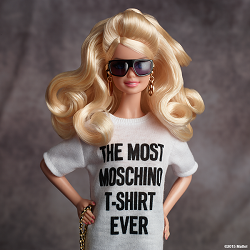By Bob Allen
Southern Baptists’ go-to authority on “gender issues” is no fan of Mattel’s new Barbie ad challenging the stereotype that boys do not play with dolls.
Bob Stith, founder of Family and Gender Issues Ministries in Southlake, Texas, and former National Strategist for Gender Issues for the Southern Baptist Convention, told Baptist Press he does not believe parents should buy their sons toys that are “clearly feminine.”
“Male children can certainly be drawn to things that are considered more feminine,” Stith said. “They may be more artistically inclined, more sensitive. This is not a bad thing. The danger is when we as a culture encourage that child to pursue a feminine identity.”
 Baptist Press asked Stith to comment on an ad going viral on the Internet introducing Moschino Barbie, a first-time collaboration between the American toymaker Mattel and the Italian fashion company Moschino.
Baptist Press asked Stith to comment on an ad going viral on the Internet introducing Moschino Barbie, a first-time collaboration between the American toymaker Mattel and the Italian fashion company Moschino.
The campaign combines a limited-edition doll dressed in miniaturized Moschino clothing and jewelry with a line of corresponding adult-size wear. Despite a price tag of $150, the Moschino Barbie was a big hit, selling out in less than a day on Nov. 9.
The commercial shows a boy with a blond Mohawk haircut playing with the Moschino doll with two other girls. “Moschino Barbie — so fierce!” he tells the camera.
Mattel, which for years has been criticized for promoting gender stereotypes and unrealistic body images for girls, suddenly drew praise for an “inclusive move” similar to retailer Target’s recent decision to remove gender distinctions on products for kids.
Mattel clarified the commercial won’t be showing up on Saturday morning cartoons, describing it in a statement to the BBC as a “fauxmercial” parodying iconic Barbie commercials from the 1980s.
The boy is made up to look like Moschino creative director Jeremy Scott, who called the creative shots during the filming paid for by Mattel.
“When I dreamt up the concept for the Moschino Barbie fauxmercial, I felt it was natural to have a little boy representing for all the little boys like myself who played with Barbies growing up,” Scott said.
Stith told Baptist Press the ad clearly portrays the boy as “effeminate,” pointing to his mannerisms, voice inflections and little wink at the end.
Stith said his issue with the ad is not the abandonment of “gender stereotyping,” but rather “abandoning gender identity” in a culture bent on eliminating gender distinctions.
“It seems clear also that many today think that it is ultimately helpful to a child to affirm him or her if they manifest tendencies that are not generally considered to be consistent with their biological gender,” Stith said.
“This ultimately adds to a child’s confusion rather than lessening that confusion,” he continued. “It has contributed to a culture that seeks to convince the world that it is harmful — and even evil — to seek to help a child grow into his true gender identity, but it is a good thing to give them drugs and ultimately surgically mutilate them.”
Stith said it is more important than ever for churches to learn how to encourage children to accept their “biological gender identity.”
“We must understand and teach that there is nothing inherently wrong with a male child who is sensitive and/or artistic,” Stith said. “He may have no interest in hunting or playing sports. That doesn’t determine gender identity.”
Stith said he is also not overly concerned about very young boys playing with dolls.
“This can help them learn and express tenderness,” he said. “But this should not be what they play with exclusively, and it shouldn’t be long term.”
Stith, who for 37 years served as pastor of Carroll Baptist Church in Southlake, Texas, introduced a motion at the Southern Baptist Convention annual meeting in 2001 establishing a task force “to inform, educate, and encourage our people to be proactive and redemptive in reaching out to those who struggle with unwanted same-sex attractions.”
In 2007 LifeWay Christian Resources and the SBC Ethics and Religious Liberty Commission jointly hired Stith to work with the convention’s Ministry to Homosexuals Task Force, unveiled as Southern Baptists’ “next step in ministry to homosexuality.”
“While we as Southern Baptists have consistently resisted the efforts of some in the culture to affirm homosexuality as normal and acceptable, we must remember that homosexual behavior is not the unpardonable sin,” then-ERLC President Richard Land said at the time. “We must be committed to sharing God’s love with all people — including homosexuals.”
“Our biblically based opposition to the normalization of homosexuality and the affirmation of homosexual behavior should not hinder us from ministering to homosexuals and offering them the love and healing environment they need to leave this destructive and unbiblical lifestyle,” Land said.
At a June 13, 2007, press conference, Stith said he harbored a “degree of condemnation and judgment” toward homosexuals before God convicted him of his attitude in 1994.
